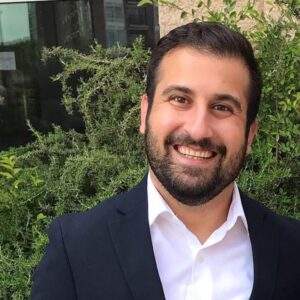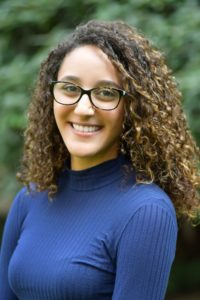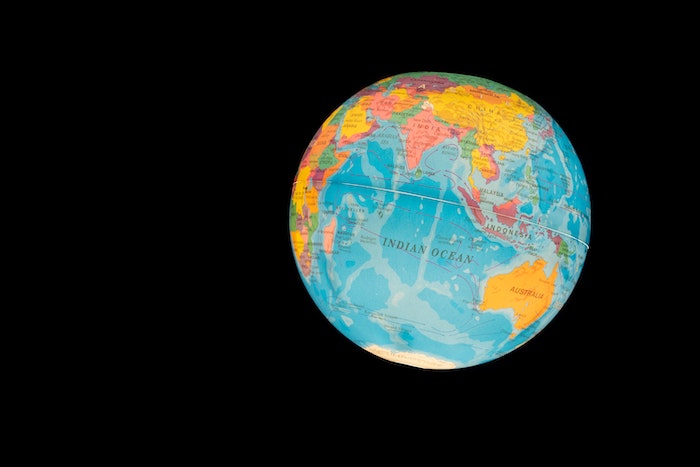Guest post by Marah Wahbeh and Arby Abood.
Last year, after a casual conversation with Spanish-speaking early career scientists about the struggle of communicating their work in Spanish, Jessica Vélez, PhD, was inspired to create the Multilingual Seminar Series. This series offers an opportunity for multilingual and non-English speaking scientists and science enthusiasts to talk about science in languages other than English, while also providing a space to discuss strategies for expanding science communication efforts to include non-English speakers.
When Jessica, who is also the GSA Membership, Engagement, and Early Career Program Manager, reached out to us to ask for our help in organizing and hosting the Arabic session, we enthusiastically agreed. Although we speak Arabic fluently, we use English to discuss our research. It wasn’t until Jessica invited us to collaborate that we realized we have isolated our identities and work as scientists from our mother tongue. This helped us realize that science accessibility has been limited in many ways to only English speakers.
With that as our motivation, we helped create the multilingual seminar session in Arabic, both as a way to explore the linguistic gap that exists, as well as to practice speaking and discussing science in Arabic with other scientists who share the same experiences. We started planning for the session by identifying our goals, as well as potential panelists. During this phase, we realized there is a scarcity of scientific resources in Arabic, as well as Arabic-speaking science communicators, which emphasized the need for this event.
When we reached out to potential panelists via Twitter as well as our networks, we saw first-hand a growing excitement about the opportunity to participate. Once we confirmed the panelists, we began advertising the event. Our efforts included reaching out to Arabic-speaking research groups on Facebook, sending out emails to institutions, as well as reaching out to students in the Middle East that we know. Our advertising efforts resulted in over 700 RSVPs!
The panel was comprised of Arabic-speaking scientists and science communicators from different levels of the academic track who are experts in their fields. This included: Rana Dajani, PhD; Ghada Amer, PhD; Tarek Abbas, PhD; Mouadh Benamar, PhD; and Eman Rabie, MSc.
During the seminar, they started by sharing their career journey and experiences with science communication in Arabic. Throughout the event, the discussion was very engaging as the panel had a wide range of expertise, experiences, and opinions on the topics discussed. Everyone agreed that every person has the right to learn science, as well as have access to the benefits of its advances, and that since the majority of the world’s population don’t speak English, science communication needs to expand to include other languages. Dr. Rana Dajani, professor of biology and biotechnology at the Hashemite University in Jordan said that “sometimes we forget that language can be a barrier and have a duty to society as scientists to make science accessible to all.”
During the session, one of the discussions was about expanding accessibility through direct (literal) translation of science concepts and words from English to Arabic. This sparked a debate on the sufficiency of translation alone and whether or not it is necessary in all cases. In the words of Dr. Tarek Abbas, Assistant Professor of Radiation Oncology at the University of Virginia, “we need to differentiate between the language of science and using a language to talk about science.” Dr. Ghada Amer, Vice Dean for Postgraduate Studies and Research in the College of Engineering at Benha University, added that learning and using English is necessary for us as scientists to engage in the modern-day scientific community; however, the best scientists are those who are able to effectively communicate their science to their own communities.
This is where science communication efforts play a huge role. Although translation can help, understanding scientific concepts requires the use of simplified language that is clear of scientific jargon, similar to discussions around science communication to an audience of English speakers. It’s also important to note that the audience for whom a scientist speaks determines the language.
Simplified language or not, “we can’t deny that there is a benefit to a universal language for science and having it be English is just what it is now,” Dr. Abbas said. The use of one language to discuss science facilitates collaboration across the world, makes communication between scientists easier, and overall, is similar to the many other industries and professions that use English as their language of communication.
Although many agreed with Dr. Abbas, others had the opposite idea. Because science is for everyone including all who speak different languages than English, limiting its accessibility to English speakers creates a language barrier that excludes the majority of the world’s population. This barrier can be eliminated if we expand the use of science terms to other languages.
The panelists also shared different initiatives and efforts for communicating science in Arabic. Dr. Dajani described an initiative in Jordan that encourages students to read, write, and contribute to simple science content online in Arabic through translating Wikipedia pages. This allows contributors to learn how to engage in science in Arabic while also benefiting people who are searching for explanations of science concepts in Arabic online. Other efforts include conferences focused on showcasing Arab scientists such as MIT’s Arab Conference and Arab-American Frontiers of Science, Engineering, and Medicine Symposium. Dr. Amer shared that the Arab Science & Technology Foundation started the Center of Strategic Studies for Science and Technology last year, with the goal of engaging Arabic-speaking scientists. Moreover, networks like the Society for the Advancement of Science and Technology in the Arab World (SASTA) were mentioned as a way to connect and learn from the expertise of other Arabic-speaking scientists. The panel also suggested that future initiatives should focus on translating scientific jargon into standardized Arabic phrases, paralleling practices already implemented in Mandarin and Cantonese.
There is a need for spaces where non-English speaking and multilingual scientists can talk about science and science communication in an inclusive way that does not exclude non-English speakers. This is highlighted by the fact that we had 200 extremely engaged participants from all over the world with differing science backgrounds. 88 responded to a feedback survey with the majority expressing positive feedback and interest in events like this in the future. As one of the attendees shared, “I think the most valuable aspect of the event was the fact that there were Arabic-speaking scientists representing different countries and each had unique interests.”
In conclusion, discussion series like GSA’s Multilingual Seminar series not only address the language barriers in science, but also stress the need to use our multilingual expertise to discuss and share science to those who don’t speak English. Moreover, given the recent uptick of misinformation perpetrated by anti-science propaganda across the world, having the tools of communicating science in two or more languages is essential.
Join the GSA’s Multilingual Slack workspace to connect with other scientists in multiple languages!
About the authors:

Abdullah “Arby” Abood is a PhD candidate, bioinformatician, and data scientist at the University of Virginia School of Medicine. Arby’s research focuses on leveraging the transcriptome to inform bone mineral density (BMD) genome-wide association studies (GWAS). Arby is an alumnus of the NIH Biomedical Data Science training grant. Website: www.arby-abood.com Twitter: @ArbyAbood

Marah Wahbeh is a member of the Early Career Scientist Policy and Advocacy Subcommittee and a 5th year PhD candidate in Human Genetics at Johns Hopkins. She works in the lab of Dimitri Avramopoulos where she studies schizophrenia genetic risk variants in stem cells.































